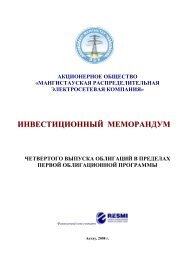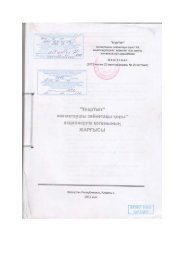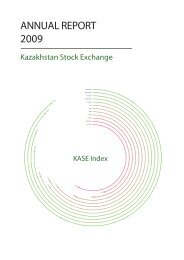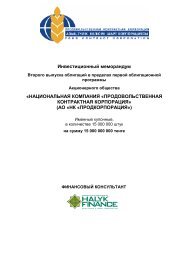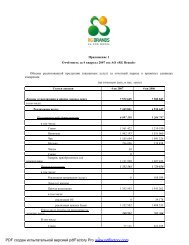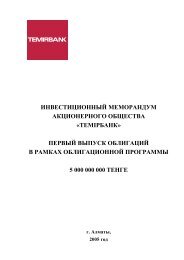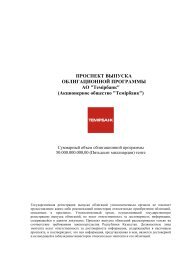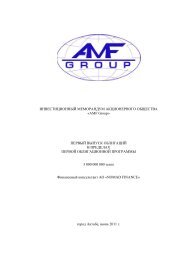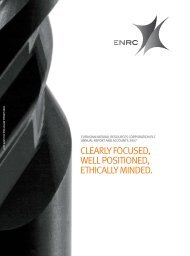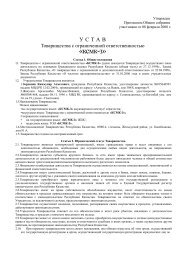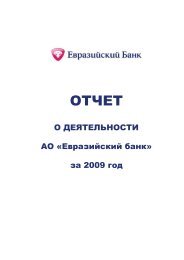JPMorgan - KASE
JPMorgan - KASE
JPMorgan - KASE
Create successful ePaper yourself
Turn your PDF publications into a flip-book with our unique Google optimized e-Paper software.
the environment with concentrations of pollutants within the requirements of applicable laws.<br />
Other facilities utilized in the refinery include tank farms, cooling towers, rail discharge and load<br />
facilities and flare stacks which generally comply with modern environmental requirements.<br />
The treated water discharged from the Shymkent refinery is sufficiently clean to discharge, but it<br />
is not potable, nor is it recommended for agricultural use. The Shymkent refinery has a permit to<br />
pump the treated water by pipeline into a settlement pond located 96 km northwest of the<br />
refinery at a site called Akdala. The refinery complies with the discharge requirements for this<br />
settlement pond.<br />
We believe that there are no significant environmental liabilities arising from the operations of<br />
the Shymkent refinery prior to the HOP privatization. Although we can provide no assurances<br />
that a hidden environmental problem may not be found in the future, Kazakhstan’s privatisation<br />
law allocates financial responsibility for environmental damage which occurred prior to the HOP<br />
privatization to the Kazakhstani government. However, no baseline with respect to<br />
environmental damages that occurred prior to the privatisation of HOP has been established. A<br />
significant portion of our 2002 investment budget for the Shymkent refinery was dedicated to<br />
environmental and safety operations.<br />
We believe that, to date, there have been no significant amounts of contaminants released from<br />
the operation of any of HOP’s assets since its privatization, including the Shymkent refinery.<br />
However, in the event that discharges into the environment or environmental damage caused by<br />
non-compliance with environmental laws or regulations occurred after the completion of the<br />
HOP privatization or after the completion of the HOP acquisition, we could incur significant<br />
liability for damages, clean-up costs and/or penalties as a result. Any environmental liability could<br />
have a material adverse effect on us. To date, we have not established any provision for potential<br />
environmental liabilities for our Downstream operations.<br />
Employees<br />
As of September 30, 2002, we had a total of 3,423 employees, of which 1,456 employees were<br />
employed in our Upstream operations and 1,851 were employed in our Downstream operations.<br />
We consider our relations with our employees to be satisfactory. Our Canadian and expatriate<br />
work force is not unionized. The employees of HKM and HOP are unionized. Our agreements<br />
with these unions serve to define the parties’ respective social obligations and do not have<br />
minimum wage or compulsory arbitration terms. The government of Kazakhstan has minimum<br />
wage laws that apply to our operations. We have never experienced a strike.<br />
Both our Upstream and Downstream operations were previously owned and operated by the<br />
government of Kazakhstan. Since our acquisition of these operations, we have worked to<br />
introduce and encourage western work practices. In our Upstream operations, we have outplaced<br />
a large number of our employees since the fourth quarter of 1999 and successfully assisted<br />
many of them to set up businesses of their own, including in the transportation, construction,<br />
repair, catering, medical and security fields, which now provide services to HKM on an<br />
outsourced, independent contractor basis. We are in the process of implementing this policy in<br />
our Downstream operations. In addition, we have invested in training programs for our<br />
Kazakhstani employees, and have encouraged and intend to continue to encourage many of<br />
these employees to assume management positions in our operations. We believe these policies<br />
will foster continued good relations with our native Kazakhstani employees and with the<br />
government authorities in Kazakhstan.<br />
84




